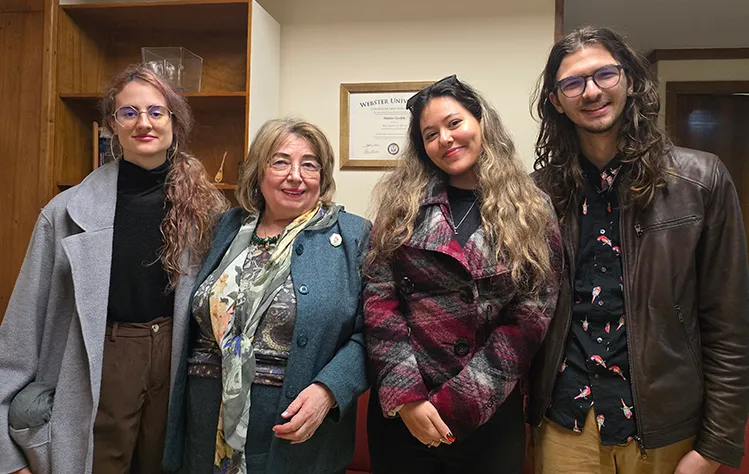Contact the Admissions Office
Call +30 211 999 5309 (office) or email athensadmissions@webster.edu
or Admissions Director, Margarita Lazarou, at margaritalazarou@webster.edu
Bachelor of Science and Bachelor of Arts
Programs approved by the Ministry of Education, Research and Religious Affairs of the Hellenic Republic.
Call +30 211 999 5309 (office) or email athensadmissions@webster.edu
or Admissions Director, Margarita Lazarou, at margaritalazarou@webster.edu
Psychology students at Webster University have the opportunity to study the science, philosophical issues and theories of the discipline in an engaging environment. Offering a diverse psychology curriculum, Webster's psychology professors use approaches that range from the scientific to philosophical, and the experimental to theoretical. Through exploration of these methods, psychology students develop and apply problem-solving skills that help them think analytically and communicate persuasively in the professional world.


The psychology graduate has gained skills in scientific, analytical and critical thinking, and is able to apply the scientific method to real-world problems. They have knowledge of human behavior and mental processes and an appreciation of diverse perspectives. Webster's psychology undergraduate degrees prepare students to pursue graduate study in a wide variety of disciplines or to pursue entry-level jobs in a variety of careers, including social worker, science writer, employment counselor, probation officer, computer programmer, urban planning officer and pharmaceutical sales representative.
Webster's BS in Psychology is only available at Webster's international locations, like the Athens, Greece, campus. This program is designed to provide the biological, cognitive, personality and social contexts for understanding the behavior of individuals throughout their lifespan.
This bachelor's degree program is designed to provide students with a foundation in the field of psychology. Students will gain an understanding of the complexity and diversity of human behavior and the psychological theories and concepts which help explain human behavior.
The number of required credit hours is the clearest difference between the two degrees. Although the BA in Psychology program has the international language requirement, the BS in Psychology does not. Instead, the BS in Psychology requires a core set of four classes (13 credit hours) of non-psychology classes and two additional psychology electives (6 credit hours). The BS in Psychology also requires two classes that the BA in Psychology does not:
Additionally, the BS in Psychology has two additional learning objectives: detail the biological and genetic underpinnings of human behavior, and develop a research hypothesis based on the available literature in psychology and then collect, analyze and interpret data to address the question.
| Comparisons | Bachelor of Science | Bachelor of Arts |
|---|---|---|
| Credit Hours | 64 credit hours | 39 credit hours |
| Non-Psychology Supporting Core Requirements | Yes | No |
| Language Requirement | No | Yes |
| Required Senior Thesis (PSYC 4825) | Yes | Recommended |
| Required Advanced Statistics (PSYC 4750) | Yes | No |
| Psychology Electives | 15 credit hours | 9 credit hours |
Students who successfully complete the BS in Psychology will have the foundation, research skills and data analysis expertise to succeed in a MA/PhD psychology graduate program (e.g., clinical psychology, experimental psychology, etc.).
Students who successfully complete the BA in Psychology degree may be able to apply psychological principles to become a more effective manager, supervisor or educator. In addition, some students may be able to pursue a variety of career and graduate opportunities within psychology, counseling and related fields (e.g., nursing).
Upon completion of the program, students will be able to:
* Bachelor of Science degree only
The 64 credit hours required for the Bachelor of Science in Psychology include the following:
*Bachelor of Science degree only
The roles of biological processes, structures and inherited tendencies in explaining human behavior.
The diagnosis and treatment of mental, behavioral disorders and adjustment problems.
Examination of how individuals grow, develop and change throughout the lifespan.
Examination of the mental processes and environmental situations that underlie, shape and control behavior.
The roles of social and cultural influences on behavior.
The 39 credit hours required for the Bachelor of Arts in Psychology include the following:
The roles of biological processes, structures and inherited tendencies in explaining human behavior.
The diagnosis and treatment of mental, behavioral disorders and adjustment problems.
Examination of how individuals grow, develop and change throughout the lifespan.
Examination of the mental processes and environmental situations that underlie, shape and control behavior.
The roles of social and cultural influences on behavior.
Only the Bachelor of Arts in Psychology requires 3 international language requirement credit hours.
General minor is appropriate for students who are pursuing a career that has a significant connection to psychology and who wish to deepen their understanding of human behavior by exploring relevant psychological theories and concepts.
Upon completion of the program, students will be able to:
In addition to the general University requirements for a minor:
Three courses from the following:
Two courses with any PSYC prefix (6 hours)
Founded in 1915, Webster is an independent nonprofit university with students studying at campus locations in North America, Europe and Asia, and in a robust online learning environment. With its main campus in St. Louis, Missouri, USA, Webster University’s network of faculty, staff, students and alumni forge powerful bonds with each other and their communities around the globe. The University is committed to engaged learning experiences and empowering our students to become catalysts for change. In 2014, Webster Athens joined our network to bring the best of American education with the only fully owned and controlled (academically and financially) accredited campus of a U.S. university in Greece.

December 22, 2025
December 2, 2025
Experts, diplomats and graduate students formed a dynamic conference on Security, Migration and Human Rights in the...

October 30, 2025

August 4, 2025

July 3, 2025
May 27, 2025
From May 18 to 23, a group of 23 undergraduate student leaders from across the Webster global network gathered at the...